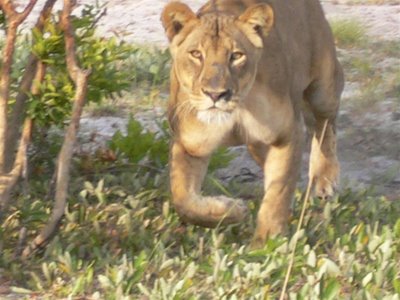 Easier said than done...
Easier said than done...
It's 5AM. I'm sleeping in a tent alone. I'm roused from my sleep by a deep gentle growl. Is that a hyena? Maybe a lion? Ahhh a cheetah? No, just a dream? Yes, probably just a dream. "Rooooooooooaaaaaaaaaar" Nope, definitely a Lion.
Once you've heard a lion roar, you'll never forget the sound - it resonates within. It creates a strange desire for you to see the lion with your own eyes - we grab a flashlight.
Four of us are huddled around the light, crouching within 20 meters of Lady Liuwa, a lioness in heat, who is in the prime of her life - thrilling. She's quite peaceful, lying in the grass under a tree, her eyes fixed, obviously as intrigued of us as we are of her.
Dexter, a local of Liuwa Plains, is operating the flashlight. I feel safe standing next to him; he lives here and interacts with all sorts of dangerous animals. The Lioness' eyes glow from the light. Suddenly, with great agility, she leaps up on all fours! Someone gasps and scrambles away! The three of us are left stunned. Fight, flight or freeze? No time to think. The 'you don’t have to outrun the lion, you just have to outrun your friends' mentality kicks in and the three of us bolt for safety. I am sure it is the fastest I have ever moved!
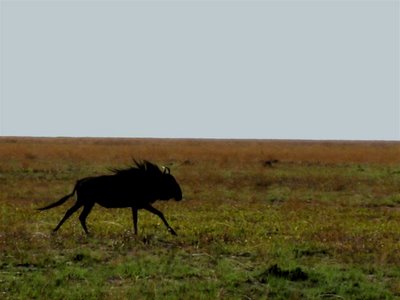 You're probably thinking, what am I doing playing with lions? You thought I was coming to
You're probably thinking, what am I doing playing with lions? You thought I was coming to
Well that is the goal, but to gain sufficient understanding to improve a complicated situation you have to be patient. You have to sit listen and learn from local people. And you have to make sure not make any quick or potentially dangerous decisions.
In reality, the lion was just curious about us and wanted to get a better look. Our reaction was the worst thing we could have done. Flight is her queue to attack. Had we known this, we would have stood our ground and been safe, instead we ran.
Similarly it's important that we take ample time to intimately understand life in the Liuwa Plain before designing and executing our intervention. This is serious business - people's lives, people's incomes, people's trust and goals. I've started learning that the area presents a very unique situation.
Liuwa Plains
Kalabo is a small remote town located just across a river, from 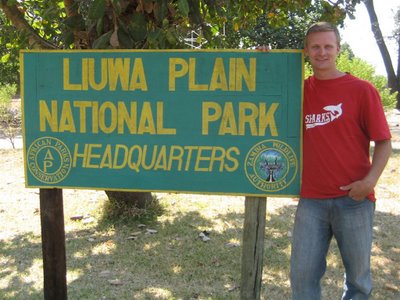 Travelling here from Lusaka (the capital) is no easy task as it involves either crossing a massive flood plain on a nasty road (in the dry season) or by travelling 80kms by boat (in the wet season).
Travelling here from Lusaka (the capital) is no easy task as it involves either crossing a massive flood plain on a nasty road (in the dry season) or by travelling 80kms by boat (in the wet season).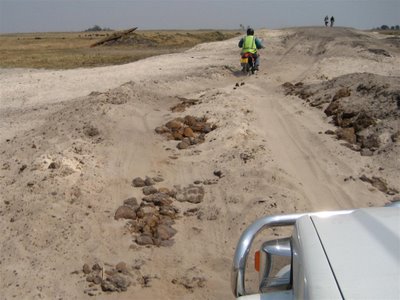 The National Park is one of the only Wild Game Parks in the world where people and animals live together. Conservationists usually say that human are too big of a risk to the animals and vice versa. But in this case, the Lozi People have been here for thousands of years and are here to stay.
The National Park is one of the only Wild Game Parks in the world where people and animals live together. Conservationists usually say that human are too big of a risk to the animals and vice versa. But in this case, the Lozi People have been here for thousands of years and are here to stay.
The folk tales say that the Lozi were sent by the Paramount Chief (the Litunga) to watch over the animals to create a protected hunting ground for the Chief. This Litunga leads the traditional government system called the Barotse Royal Establishment (BRE) which is still in place today. They work together with the modern national government to manage the Western Province of Zambia.
Because of the power and autonomy of the BRE, the western province has been neglected by the national government in terms of services, resources and programmes. The Lozi people are probably the most traditional and different people in all of
Flood Plains
Each year, during the rainy season, the mighty 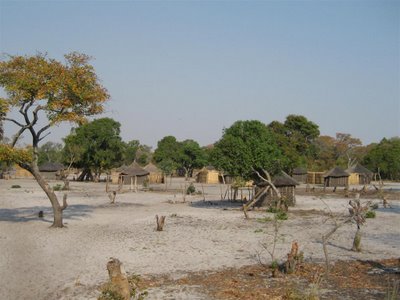 The main income generating activities are fishing, farming, livestock and some crafts. While it is remote and people's incomes are limited, entrepreneurs are not hard to find, even in the middle of empty field - people are very resourceful.
The main income generating activities are fishing, farming, livestock and some crafts. While it is remote and people's incomes are limited, entrepreneurs are not hard to find, even in the middle of empty field - people are very resourceful.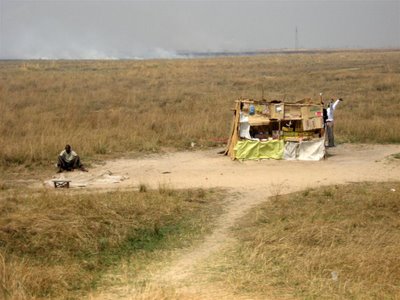 During certain months, fishing is the main source of food and income. As the river floods the plains, large fish stocks escape from the currents and take refuge in the shallow flood plain waters. As the hot sun evaporates the water and the land begins to dry, large ponds are left plump with bubblefish and tigerfish. As the ponds continue to shrink, the fish become more and more populous. Fishing in these ponds is done with nets and spears while fish are usually pulled from the river with nets and lines from canoes.
During certain months, fishing is the main source of food and income. As the river floods the plains, large fish stocks escape from the currents and take refuge in the shallow flood plain waters. As the hot sun evaporates the water and the land begins to dry, large ponds are left plump with bubblefish and tigerfish. As the ponds continue to shrink, the fish become more and more populous. Fishing in these ponds is done with nets and spears while fish are usually pulled from the river with nets and lines from canoes.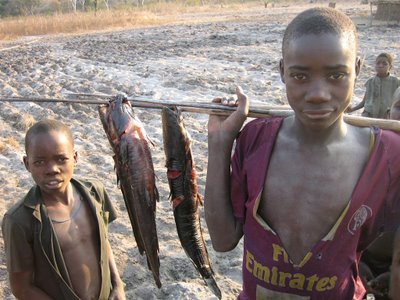
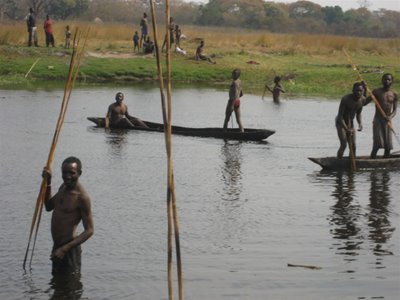
Livestock, mainly cattle, are an important part of many people's livelihoods. The traditional breed takes a very long time to mature (8 years until large enough for market) and are therefore kept mainly as status and insurance. When an emergency hits you can sell a cow to absorb the shock or slaughter and eat one in times of drought.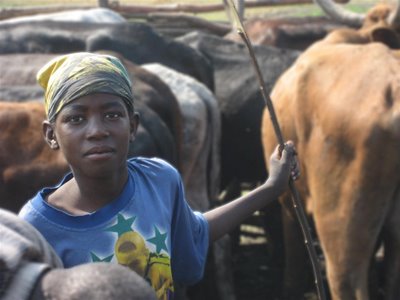 Farming in a flood plain is very different than farming in most other parts in
Farming in a flood plain is very different than farming in most other parts in 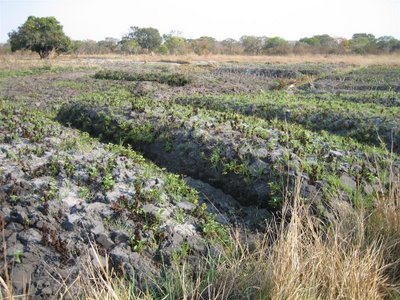
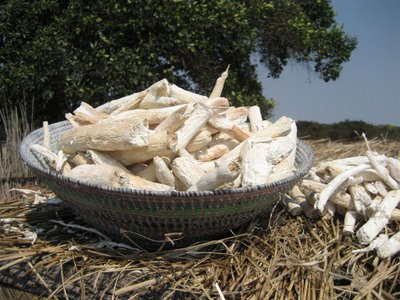 Baskets and mats are a favourite crafts of women in the area. The materials can be found locally and finished mats are often seen floating down the river enroute to the market in Mongu, a larger town 80km away. One woman told me that she's proud to make mats, as "the work is easy and profitable."
Baskets and mats are a favourite crafts of women in the area. The materials can be found locally and finished mats are often seen floating down the river enroute to the market in Mongu, a larger town 80km away. One woman told me that she's proud to make mats, as "the work is easy and profitable."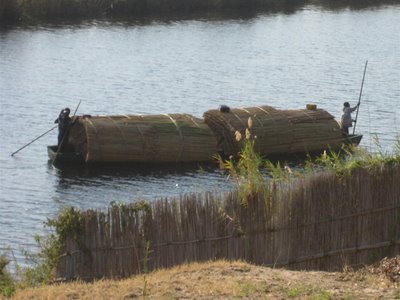
Community Meeting
Last week, we held our first community meeting in a village called Salunda. We were greeted with drums and songs and a fine group of 60 proud farmers and villagers awaited us. Our trip on motorcycles was gruelling through the thick sand and we arrived exhausted and dirty.
Although my fatigue and hunger challenged my concentrating, we persevered and had a great introductory meeting with the community. They were very happy to hear from us and we were happy to hear from them. The community spoke of the projects they were currently undertaking to improve their villages. From building rural health centres, to running a hammer mill, to repairing the shallow well, to promoting health and nutrition to farmers - they were moving.
The meeting was great - definitely an active and organized community. At the end of the meeting I asked a particularly old farmer "Muzwakai sha" which means where are you from, sir. He point to the east. I asked how far and he said "not far." I asked how long it took him to walk and he said "maybe three hours." THREE HOURS WALKING! Each way! And I was feeling hungry and tired from my small journey. He made no complaints. Two things became clear (1) was that transportation is no easy game here and (2) I really need to toughen up.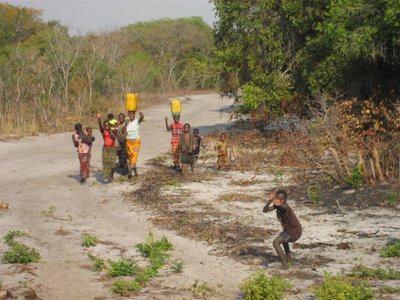 During the dry season in the plains, the sand is very fine and deep and can swallow up anything trying to move quickly. Local people move around on foot or with oxen. The oxen pull either carts or sleds, depending on the load, the distance and the owner.
During the dry season in the plains, the sand is very fine and deep and can swallow up anything trying to move quickly. Local people move around on foot or with oxen. The oxen pull either carts or sleds, depending on the load, the distance and the owner.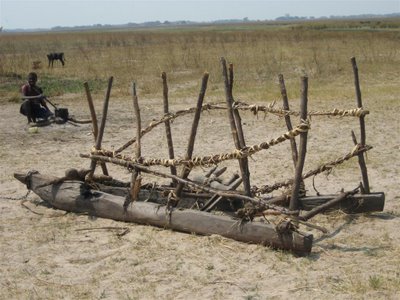 For the villages that are close to the river boats and rafts are often used for transportation.
For the villages that are close to the river boats and rafts are often used for transportation.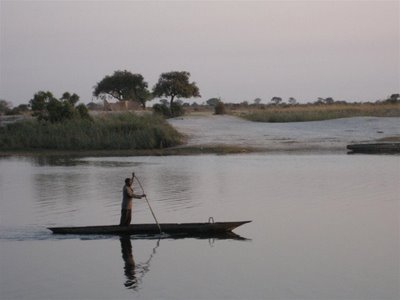 But people have to be very careful in and around the river since there are both crocodiles and hippos lurking. I still haven't seen a hippo completely out of the water, so I can't answer the ultimate question of "how big a hippo really is" but take a look at the picture of this young hip bull! That's one mean looking dude.
But people have to be very careful in and around the river since there are both crocodiles and hippos lurking. I still haven't seen a hippo completely out of the water, so I can't answer the ultimate question of "how big a hippo really is" but take a look at the picture of this young hip bull! That's one mean looking dude.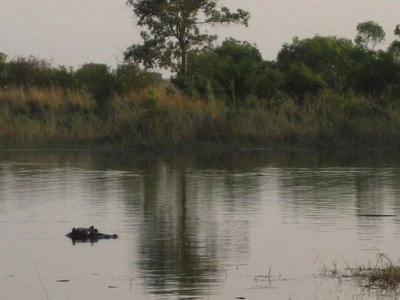
How is the project?
The first step is to really understand the situation and context. People here have a good understanding of their complex and diverse livelihoods and it is from this knowledge and their goals that we'll set a good plan to move forward. It looks like we may be working with cattle, farming, tourism, and a micro finance project, but again it's too early to say anything for certain. For the first while we really just need to shut up and listen and learn!
How am I?
I am healthy, happy and feeling great. I haven't been sick and I am surrounded by good company. I'm still getting settled so I'll write all about my living arrangements and personal life in the next update!
What makes me very happy is that I haven't met a single Zambian who talks of dreams of going to
I've got to run now; I'm meeting my Lozi teacher Mr. Muyeye in 20 minutes for a lesson! If you'd like to learn a bit too, try greeting someone today by saying "muzuhile hande" which means good morning and is pronounced just how it's spelled.
I hope you found this interesting! Thanks for tuning in and please leave comments if you want me to write about specific things!
Take Care,
-
PS. My Cell phone number is +260 99 787 167 if you'd like to call! Click on the "local time link" on the right of my blog to make sure you call at a good time!
PPS. I've also posted a link for a great Zambian song by a kick-ass artist named Chasaya if you'd like to sample some Zambian tunes. I'd recomend Tizaonana. Click HERE
See these pictures in a slideshow here:
http://tinyurl.com/ynfo4y
8 comments:
10 Comments:
• At 10:42 AM, Susie said…
fantastic web site, I am a granny of 63 years in UK and I am so envious of you being able to be in Zambia, does anyone want to adopt a granny over there?!!
Somehow the smiles of the people in these places put our frowns and grumbles to shame
good on you! keep it up.
warm wishes
janetsue@http://www.susie-working-from-home.blogspot.com
• At 4:37 PM, Levi said…
Chad,
Thanks for a great entry! Nice to see you're learning all about livelihoods and feeling fine.
Ride till dawn amigo.
Levi
• At 9:10 PM, Mallory said…
An inspiring post Chad! Glad to hear your are healthy and happy with the progress so far. You are doing awesome work. Try to stay away from lions!!
Love Mom and Dad
• At 5:04 AM, Robert Borzychowski said…
Awesome post Chad!!! Keep it up. How many white people do these farmers see? It appears that you are way out in the middle of no where. Do the big NGO's still get out there. Do you see any of the culture of recieving handouts that you can see in bigger cities with more NGO's.
Moosee a le hande
• At 10:44 AM, Mr Bérubé said…
Hey Chad !!
C'est bon de voir que tout va bien pour toi !! Je t'envie tellement d'être en Zambie présentement... Chanceux va !! Mais bon continue à faire du bon travail et j'attends avec impatience de tes nouvelles !!
Mr Bérubé
• At 11:18 AM, Sarah Craig said…
Hey Chad,
Awesome read. It is good to hear from you, I always wondered how you were doing! Keep sending me updates it so much more interesting than work!
Sarah
• At 9:15 AM, Bitter Sweet said…
Wow... Chad... Dude thats great - I lived in Zambia for many many moons and absolutely loved it ---- travelled between Lechwe Plains, Livingstone and Mfuwe for the job I did... its a hard life being part of a management couple ;)
After me and Andrew ended , Zambia became too sad for me to live in but I miss it and it bought back gorgeous memories listening to you describe it!
Cant wait to read your next blog x
Keep safe...
• At 4:40 PM, Manena said…
great blog! really awesome pictures and a cute face to boot! well done...enjoy your visit to my country! Too bad my lozi sucks!;)
• At 7:50 AM, Yanger said…
Good to hear that you are doing something you really believe in. You are one of the amazing people I brag about knowing to other people :)
Yang
• At 1:04 AM, Meredith said…
Chad,
Was just searching for other blogs on Zambia and found yours. I'm also volunteering for a year here, based in Lusaka. Sounds like your experience is going to be wonderful, and a lot of the things you said in your blog about the culture here ring true for me as well. If you make it to Lusaka for a visit and need a friend, don't hesitate to give me a shout: 097-540-183.
-Meredith
www.MeredithInZambia.blogspot.com
Good Job! :)
The information here is great. I will invite my friends here.
Thanks
Post a Comment